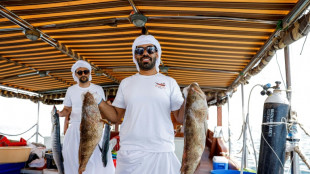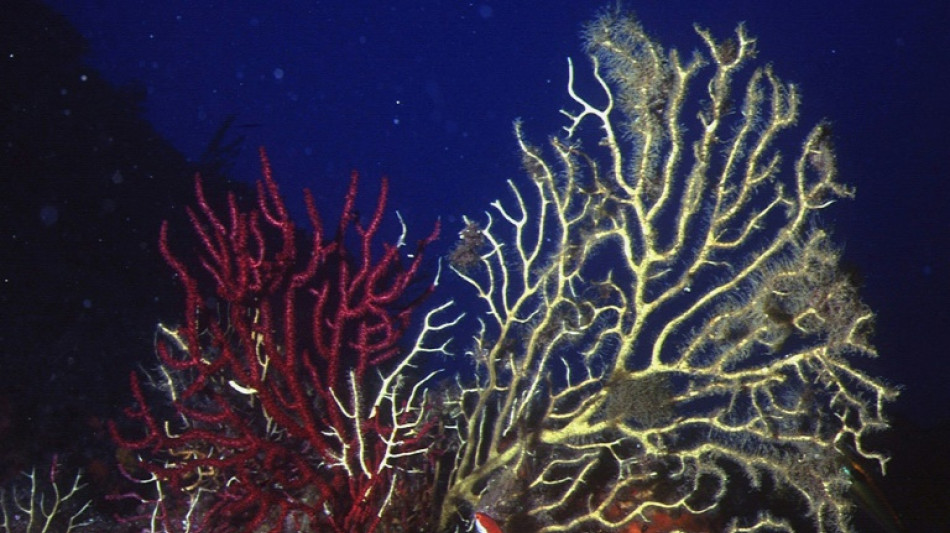
-
 Zelensky says does 'not believe' Russian truce pledge
Zelensky says does 'not believe' Russian truce pledge
-
US Fed expected to pause rate cuts again, await clarity on tariffs

-
 Ruud beats Draper to win Madrid Open and claim maiden Masters
Ruud beats Draper to win Madrid Open and claim maiden Masters
-
Far-right candidate leads Romania's presidential rerun

-
 Parag's six sixes in a row, Pant flops in IPL
Parag's six sixes in a row, Pant flops in IPL
-
Howe hails Newcastle's 'ruthless' Isak after VAR drama in Brighton draw

-
 Pant woes continue as Lucknow lose to Punjab in IPL
Pant woes continue as Lucknow lose to Punjab in IPL
-
'Thunderbolts' strikes big, topping N.America box office

-
 Kompany player-led shake-up returns Bayern to Bundesliga summit
Kompany player-led shake-up returns Bayern to Bundesliga summit
-
Leverkusen draw hands Kane's Bayern Bundesliga title

-
 Chelsea sink champions Liverpool, Man Utd crash at Brentford
Chelsea sink champions Liverpool, Man Utd crash at Brentford
-
Bielle-Biarrey lifts Bordeaux past Toulouse and into Champions Cup final

-
 Chelsea beat champions Liverpool to boost top five push
Chelsea beat champions Liverpool to boost top five push
-
Hammers' Potter reveals Paqueta's tears of frustration at Spurs draw

-
 Lyon's Champions League hopes hit by loss to Lens
Lyon's Champions League hopes hit by loss to Lens
-
Israel vows retaliation against Iran, Yemen's Huthis over airport attack

-
 Man Utd 'need to change' after Brentford loss: Amorim
Man Utd 'need to change' after Brentford loss: Amorim
-
China's Zhao dominates Williams 7-1 in first session of World Snooker final

-
 Zelensky says does 'not believe' Russian truce promises
Zelensky says does 'not believe' Russian truce promises
-
Bielle-Biarrey double lifts Bordeaux past champions Toulouse and into Champions Cup final

-
 Trump says 'I don't know' if must uphold US Constitution as president
Trump says 'I don't know' if must uphold US Constitution as president
-
Brazil police foil Lady Gaga gig bomb plot

-
 Godolphin in full bloom as Desert Flower wins 1000 Guineas
Godolphin in full bloom as Desert Flower wins 1000 Guineas
-
Almeida wins Tour de Romandie as Evenepoel claims closing time-trial

-
 Bolsonaro leaves hospital three weeks after abdominal surgery
Bolsonaro leaves hospital three weeks after abdominal surgery
-
Man Utd crash at Brentford, Isak rescues Newcastle

-
 Romanians vote in tense presidential rerun as far right eyes win
Romanians vote in tense presidential rerun as far right eyes win
-
Lyon see off Racing to set up Challenge Cup final against Bath

-
 Kolkata survive Parag's six-hitting blitz to clinch IPL thriller
Kolkata survive Parag's six-hitting blitz to clinch IPL thriller
-
Israel vows retaliation against Yemen's Huthis over airport attack

-
 Mbappe maintains Real Madrid Liga dream in Celta thriller
Mbappe maintains Real Madrid Liga dream in Celta thriller
-
UNESCO says Nicaragua quitting over press prize award

-
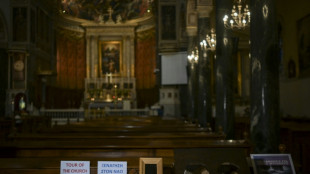 Church donation box goes digital in Greece
Church donation box goes digital in Greece
-
Germans mark liberation of Ravensbrueck Nazi camp
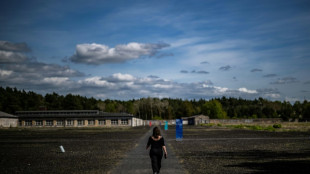
-
 Missile hits Israel airport area in Huthi-claimed attack
Missile hits Israel airport area in Huthi-claimed attack
-
DeChambeau eyes PGA Championship battle after South Korea LIV win

-
 Chinese president to visit Russia on May 7-10: Kremlin
Chinese president to visit Russia on May 7-10: Kremlin
-
'We don't care': weddings go on in Pakistan's Kashmir border

-
 Missile hits Israel airport area in attack claimed by Yemen's Huthis
Missile hits Israel airport area in attack claimed by Yemen's Huthis
-
Mexican mayor arrested in probe of alleged drug cartel ranch: govt source
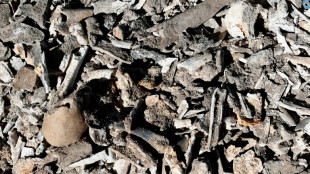
-
 Seven Iranians among eight arrested in UK counterterrorism probes
Seven Iranians among eight arrested in UK counterterrorism probes
-
Israel says area of airport hit after Yemen missile launch

-
 Romanians return to polls as far right hopes to win presidential rerun
Romanians return to polls as far right hopes to win presidential rerun
-
4 Iranians among 5 arrested in UK for 'terrorism offences': police

-
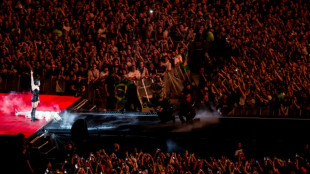 'Two million' throng Lady Gaga concert at Rio's Copacabana
'Two million' throng Lady Gaga concert at Rio's Copacabana
-
India-Pakistan gunfire triggers terror of past conflict
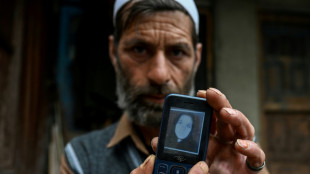
-
 UK hard right sets sights high after local election triumphs
UK hard right sets sights high after local election triumphs
-
Sexual abuse of nuns: one of the Catholic Church's last taboos
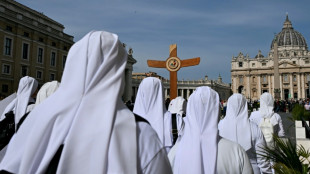
-
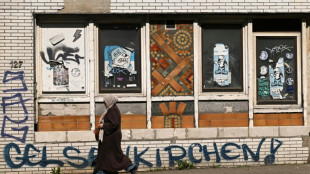 West German foothold of far-right AfD shows challenge for Merz
West German foothold of far-right AfD shows challenge for Merz
-
Maldives president holds record 15-hour press conference


Underwater heat 'inferno' ravages Mediterranean corals
In the temperate shallows of the Mediterranean, once-vibrant red and purple coral forests that provide a crucial haven for biodiversity now stand bleached and brittle, transformed into skeletons by record summer temperatures, scientists say.
Holding naked branches of gorgonian coral, Tristan Estaque of marine conservation group Septentrion Environnement is returning despondent from an exploratory dive off the coast of Marseille in southern France.
"It is heartbreaking, the deterioration is so fast," he tells AFP.
Dive surveys just two months earlier found an intact landscape, lush with violet-fringed fans of gorgonian coral.
Now it is a "ghost forest", says Estaque, with the majestic fans largely bare of living tissue.
"You have to imagine a tree where there are no more leaves, no more bark."
- Fragile forests -
Gorgonian corals, which have flexible skeletons encrusted with polyps, are found across the planet.
Those found in the Mediterranean are said to create "forests", sheltering a huge array of species.
But they are acutely vulnerable to human activities.
Fishing nets, anchors and careless divers can rip their delicate structures, while exposure to continuous and intense heat can be lethal.
Marine heatwaves are becoming more common, according to a report this year by UN climate experts.
This summer a major marine heatwave hit the western Mediterranean, with water up to five degrees Celsius (41 degrees Fahrenheit) hotter than normal, according to Mercator Ocean International, the organisation that runs the European ocean monitoring service.
In some places water reached 30C.
Recent Septentrion Environnement surveys have shown that between 70 and 90 percent of the red gorgonian population in the 10 to 20-metre zone off Marseille have since died.
The effect was like "an underwater inferno", according to Solene Basthard-Bogain, another of the group's specialists.
And it is not just near the southern French coast.
Gorgonian mortality has also been observed on the Spanish coasts and around the Italian island of Sardinia, according to Stephane Sartoretto of the French research agency Ifremer.
The severity of the impact appears to vary depending on the depth of the corals.
Along the sawtooth coastline of France's Calanques National Park, notched with craggy coves and shallow habitats where the gorgonians are found in waters of just six metres (20 feet) in places, the die-offs have been particularly intense.
In the Balearic Islands, they live deeper, at 40 metres, and were therefore less impacted, Sartoretto says.
- 'Forest fire' -
In addition to the gorgonians, sponges and bivalves have also been affected.
The marine heatwave likewise battered mussel farming, with 150 tonnes of commercial mussels and 1,000 tonnes of young stock -- for next year's crop -- lost in Spain over the summer.
A drop in temperatures in the Mediterranean could help to save those corals that were spared in the summer die-off, says Basthard-Bogain, although she worries that any pathogens that may have spread because of the heat would still be present in the waters.
There are fears, too, that another hot spell cannot be ruled out before the end of the autumn.
Sartoretto says he worries that repeated periods of heat stress could be devastating for the corals.
"We can ask ourselves about the possibility of their disappearance," he says, adding that their reproduction rate is very slow.
"Like after a forest fire on land," he says, "they will take decades to regenerate."
D.Sawyer--AMWN
